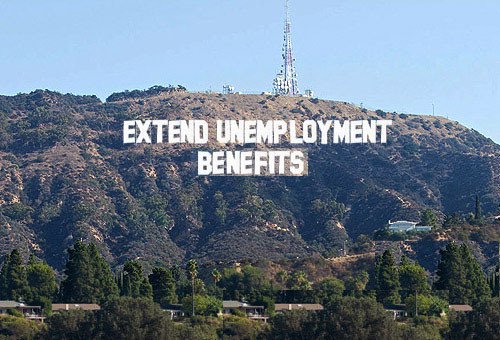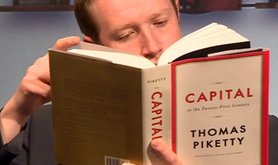
Credit: http://hillaryclintonmeme.wordpress.com. All rights reserved.
To great fanfare, the MacArthur Foundation has just released the names of those who have won their “Genius Awards” for 2014—a no-strings attached gift to artists, scholars, activists, scientists, and iconoclasts of over half a million dollars. Relieved from the burden of labor, it’s believed that these anointed few will contribute even more to society: nice work if you can get it.
One group who will never win these prizes consists of people who actually need the money to live, namely those who don’t have jobs at all. Thanks to conservatives, unemployment benefits in the USA have been cut so often that most of the jobless receive less and less security, but then that’s a good thing according to John Boehner, the Speaker of the House of Representatives. People who receive public assistance, said Boehner in answer to a question after one of his recent speeches, have “a very sick idea for our country…I really don’t have to work… I think I’d rather just sit around.”
Is there a contradiction here? In the first scenario, paying people not to work is a noble cause; in the second, it’s an accusation that’s used to justify withholding basic human necessities. But in our new book, The Power of Market Fundamentalism: Karl Polanyi’s Critique, we show that there’s actually a rationality here that’s rooted in the bifurcated view of human nature that emerged in Anglo-American culture in tandem with the birth of a new political economy in the late 18th century.
In that setting, a free market society consisted of two ‘races:’ property owners and laborers. While the first embodied the high moral character of Enlightenment rationality, the latter, also known simply as ‘the poor’ because they had to work to survive, were designed not as moral actors but as people who were motivated only by base instincts. They could do little more than ‘think through the body.’
Then, as now, these two views of humanity—one noble and elevated, and the other biologized and crassly sexualized—conveniently supported a harsh set of social policies that aimed to abolish government assistance to the ‘undeserving’ poor, while preserving and enhancing the privileges accorded to their ‘deserving’ betters.
Karl Polanyi traced the origins of these ideas to the anti-welfare zealotry of Joseph Townsend—an 18th-century English clergyman—and Thomas Robert Malthus, one of the founders of classical economics. Both advocated for an end to ‘poor relief’ in favor of exposing the unemployed to the harsh disciplines of the market.
In 1798 Malthus expressed alarm that despite a ‘generous’ welfare system, poverty in England kept increasing. While others pointed to the effects of large-scale displacement from agriculture and rural crafts, Malthus reasoned from what we call the perversity thesis—the claim that assistance to the unemployed always creates more of the poverty it aims to alleviate. In this conception, receiving unearned resources incentivizes the unemployed not to seek work, thus perpetuating their own condition.
The linchpin of the perversity thesis—just as in modern economic theory—is that scarcity is the normal state of human life. Hunger alone disciplines the unemployed to seek work and control childbirth. Remove that scarcity by ‘artificial’ means—like food stamps, unemployment benefits, or an adequate minimum wage—and the incentive to work also disappears. In his diatribe against the poor for procreating recklessly, Malthus adds a slippery caveat about the contrasting behavior of the well-off: while the lower classes are biologically driven to respond to base incentives, the better-off exercise ‘moral restraint’ and ‘prudence’ in the face of sexual temptation
Over a decade ago, President George W. Bush revived these ideas in the philosophy of “compassionate conservatism,” which regarded welfare assistance, bilingual education, and minimum wage laws as measures that hurt their beneficiaries by eroding the self-reliance required for a well-functioning market economy. Fifteen years later, any remaining compassion has been crowded out in a direct echo of Malthus in his writings:
“A man who….cannot get subsistence from his parents on whom he has a just demand, and if the society do not want his labour, has no claim of right to the smallest portion of food... At nature’s mighty feast there is no vacant cover [no place setting] for him. She tells him to be gone, and will quickly execute her own orders.”
Today’s ‘anti-compassionate conservatism’ operates from this same principle: that “cruelty is the key to prosperity” as the economist Paul Krugman put it in a recent New York Times opinion piece. Hence the refrain made famous during the 2012 election campaign by Republican Presidential hopeful Mitt Romney and later reinforced by House Budget Chair Paul D. Ryan: that 47 per cent of Americans are “takers;” that poverty relief will turn the safety net into a “hammock;” and that food stamps turn the inner city into a “culture of dependence.” According to these modern-day Malthusians, removing benefits is necessary to compel the unemployed to work even if their children suffer in the process.
Many voters share Boehner’s concern that “too many government programs don't do enough to encourage a culture of work, rather than dependency.” But the perversity thesis is persuasive only if we assume that people aren’t motivated to be independent, and are fundamentally lazy. In reality, very few people view themselves this way. Indeed, when asked what they would do with a lottery windfall, most say that they would continue to work.
Despite these findings, those who rely on government assistance are still often seen as fundamentally different from the rest of us. Some of these attitudes are the legacy of racism, and the mistaken belief that African-Americans are ‘naturally’ and disproportionately dependent on government welfare. Africans were brought to work in the New World in chains, and almost immediately, slave masters complained about their lack of a work ethic. But mostly they stem from the way in which Townsend and Malthus proselytized for a laissez-faire economy by attributing to the poor a new ‘biologized’ view of human nature.
Malthus’ enduring contribution to social policy was to make scarcity into the ‘virtuous suffering’ that underpins the possibility of a productive workforce. This belief continues to justify the eradication of policies and regulations that once laid the groundwork for greater equality and a flourishing middle class. But it also helps to make sense of the puzzle we raised at the outset: what’s the difference between MacArthur ‘geniuses’ and unemployed ‘slouches?’
The answer lies in two different conceptions of human nature: one group is seen as inherently creative and productive; the other as innately indolent and parasitic. Clearly, the same gift of ‘unearned’ funding generates radically different judgments. Voila! The poor really are different from the rest of us: whereas ‘we’ are full human persons with rational capacities and moral accountability, ‘they’ are like the other beasts that only respond to biological instincts. Only eliminating the perverse incentive of a social safety net will compel these ‘others’ to act responsibly. Anti-compassionate conservatism has triumphed on the back of what Malthus conceived as two different races.
Some might question the value of these arguments, based as they are on abstract, historical assumptions about human nature: surely there’s enough moral weight in challenging the cold-heartedness of conservative social policies at face value? Maybe, but to date that approach hasn’t had much success—so there are powerful reasons for forcing the radically in-egalitarian and degrading arguments that support the relentless drive for social welfare cuts into the open air.
For one thing, under the spell of deficit hysteria and in the name of pragmatic bipartisanship, Democrats have been all too willing to go along with modified versions of these ideas, thus endorsing the dehumanizing views of the poor and vulnerable on which conservative social policies depend.
Second, rights matter. While it is never made explicit, the ‘rightlessness’ of the poor and unemployed embodied in these policies is only acceptable because biologized creatures don’t have rights. Only fellow humans as moral actors can be rights-bearers. "American politicians don’t dare say outright that only the wealthy should have political rights—at least not yet,” writes Krugman in another opinion piece, “but if you follow the currents of thought now prevalent on the political right to their logical conclusion, that’s where you end up."
Forcing these divisive views of human nature out of the closet illuminates the true implications of anti-compassionate conservatism in a way that’s often obscured by disinformation about budget deficits and cultural prejudices. But it works both ways: it’s also time to showcase an alternative conception of human nature based on radical egalitarianism, social connectedness, and a conception of the commons in which all people are rights bearers. That is the ground for progressive social policy.
Listen to a recorded audio version of this article courtesy of curio.io.
Read more
Get our weekly email



Comments
We encourage anyone to comment, please consult the oD commenting guidelines if you have any questions.